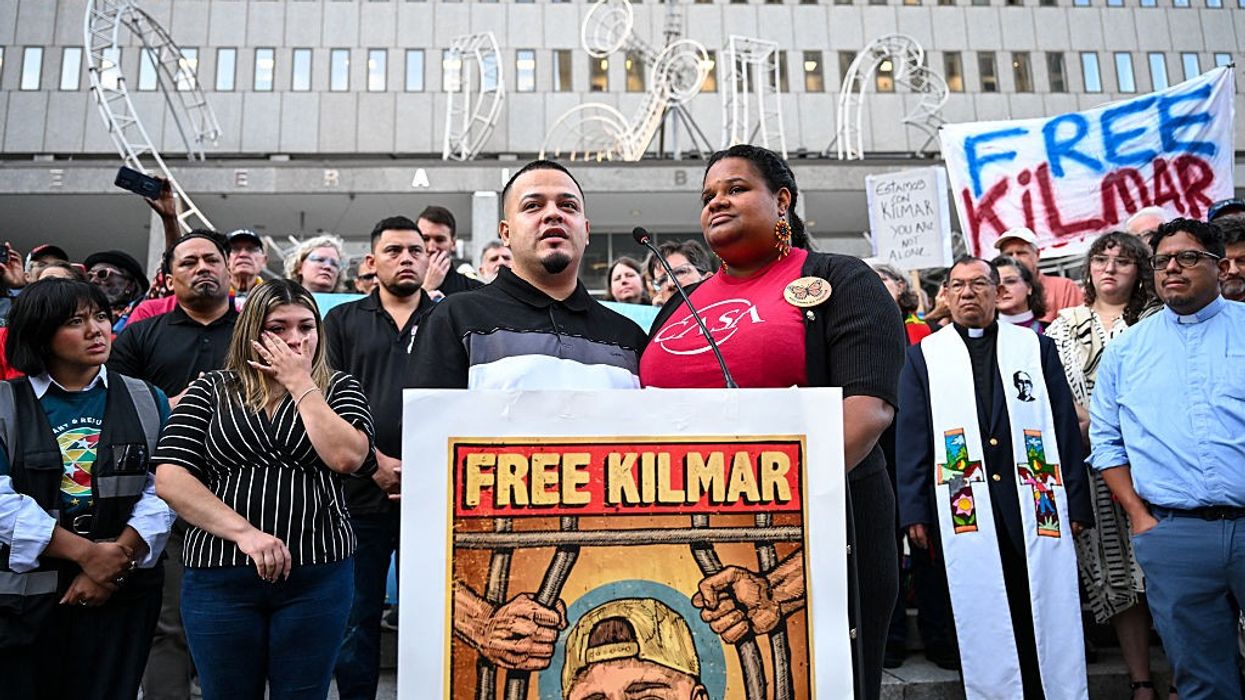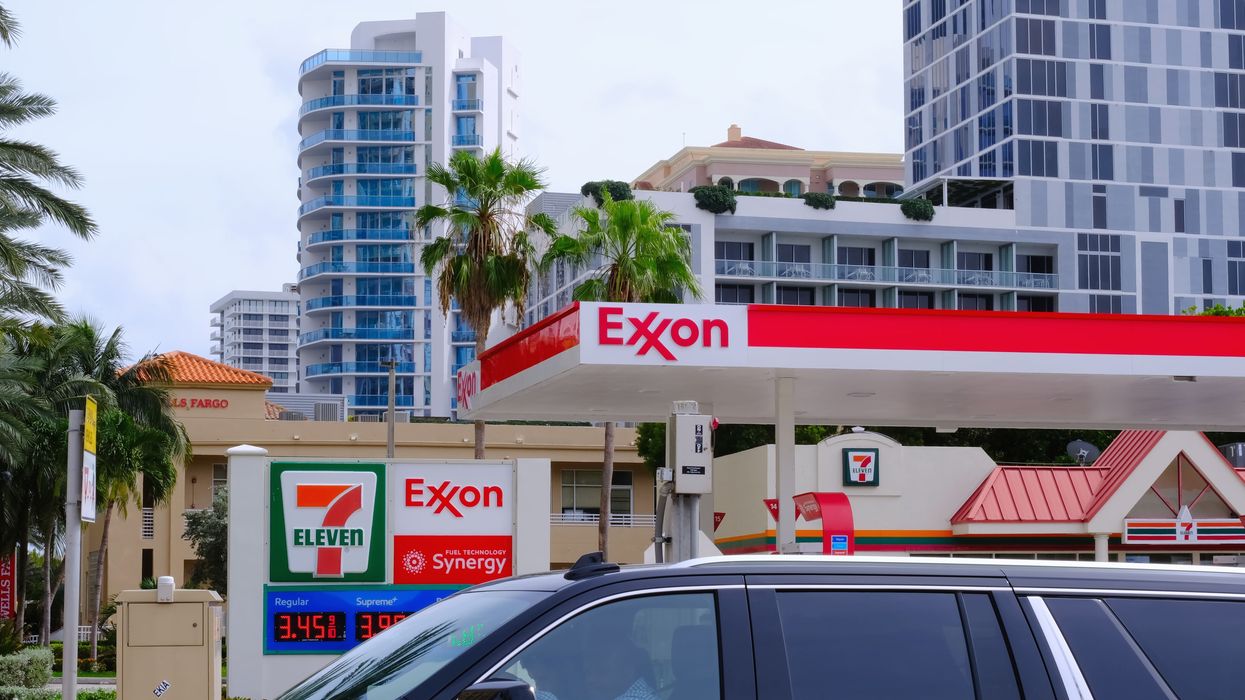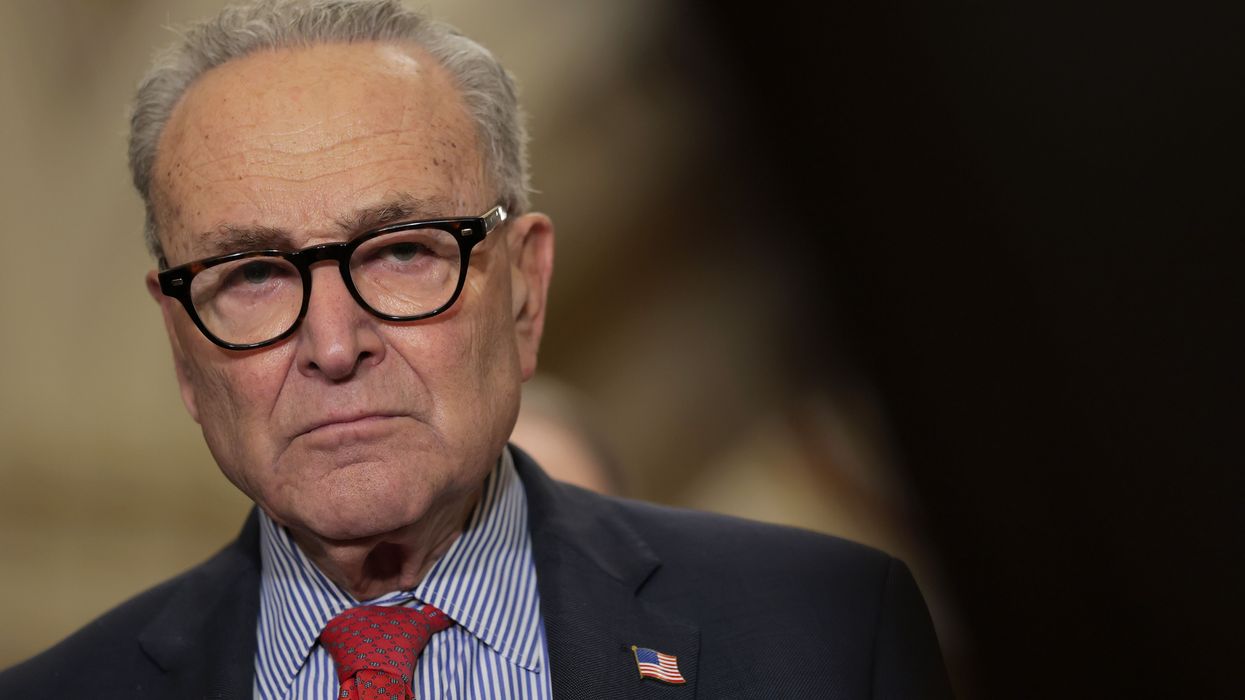June, 24 2015, 08:15am EDT
North Carolina NAACP Continues Fight Against Restrictive Voter ID Requirement
A Statement from the North Carolina State Conference of the NAACP
NORTH CAROLINA
On Tuesday, North Carolina Gov. Pat McCrory signed into law a bill that modifies H.B. 589, the state's sweeping voter suppression law - specifically, the new law amends the provision that requires strict forms of photo ID to vote. In response to the changes to North Carolina's voter ID requirement, Rev. Dr. William J. Barber, II, president of the North Carolina State Conference of the NAACP, released the following statement:
"We know that power concedes nothing without a demand. Last week's bill to change the photo ID provision of H.B. 589 was a first concession of what we expect will be many as North Carolina's Forward Together Moral Movement continues to demand full voting rights at the legislature, in the streets, and in the courts.
"Since the start of this fight, we have maintained that the photo ID requirement is discriminatory and should not be implemented in 2016. We have amassed overwhelming evidence that the photo ID requirement, along with other harmful parts of this sweeping voter suppression measure, is illegal. The General Assembly's maneuver to slightly modify it suggests that there are cracks in the armor - and that they also know that this photo ID provision will disenfranchise voters.
"Voters who have already been burdened by North Carolina's restrictive photo ID requirement include:
Rosanell Eaton, age 94, who was forced to make ten trips to the DMV and other state offices, drive more than 200 miles and spend more than 20 hours in order to obtain a voter ID because the names on her various identifying documents did not match her voter registration.
Maria Del Carmen Sanchez, who has non-matching names on her driver's license and passport, due to differing naming conventions in Latino culture. These names are also different from her married name, under which she is registered to vote. After making numerous DMV visits and follow-up phone calls, officials finally allowed Sanchez to get her driver's license to match her passport - but they still don't match the name on her voter registration.
Sylvia Kent, whose two sisters, age 70 and 68, lack the required forms of ID. When she tried to obtain proper ID for them at the DMV, she was unable to because of errors on their birth certificates (both were born at home to midwifes, in the segregated South). Despite multiple trips to several government agencies, she has been unable to rectify these discrepancies.
"Make no mistake about it: North Carolina's photo ID requirement still is an undue burden on voters. After this eleventh-hour amendment, it will take time to monitor proposed implementation and to understand its impact. What we know today is that the disparate impact on voters of color still remains. And the General Assembly has left the bulk of the discriminatory voter suppression bill untouched.
"We must not forget that this monster voter suppression law also shortens the early voting period by a full week, bans same-day registration, prohibits ballots cast out of precinct from being counted, increases the possibility of challenges to voters, and eliminates a successful voter pre-registration program for 16- and 17-year olds. Tinkering around the edges of a massive voter suppression law, which will burden hundreds of thousands of eligible voters, will not make us go away.
"We will continue our fight until all of these provisions--the full voter suppression law, including voter ID - are completely eliminated. And as we go to court next month over the many other discriminatory parts of the state's voter suppression law, we remain committed to ensuring that North Carolina's photo ID requirement is not implemented in 2016 and fully repealed."
Founded Feb. 12. 1909, the NAACP is the nation's oldest, largest and most widely recognized grassroots-based civil rights organization. Its more than half-million members and supporters throughout the United States and the world are the premier advocates for civil rights in their communities, conducting voter mobilization and monitoring equal opportunity in the public and private sectors.
LATEST NEWS
'A Forceful Stand for Our Constitution': Judge Orders Release of Kilmar Ábrego García
Judge Paula Xinis found that the Trump administration redetained the Salvadoran father of three "without lawful authority."
Dec 11, 2025
A federal judge on Thursday ordered the immediate release of Kilmar Ábrego García—who was wrongfully deported to El Salvador by the Trump administration earlier this year—from US Immigration and Customs Enforcement custody.
"Since Ábrego García's return from wrongful detention in El Salvador, he has been redetained, again without lawful authority,” US District Judge Paula Xinis wrote in her ruling. “For this reason, the court will grant Ábrego García's petition for immediate release from ICE custody.”
In early April, Xinis—an appointee of former President Barack Obama—ordered the Trump administration to facilitate Ábrego García's return to the United States after he was deported in March to the abuse-plagued Terrorism Confinement Center (CECOT) maximum security prison in El Salvador. This, after the US Department of Justice (DOJ) admitted in a court filing that Ábrego García was wrongfully deported due to what it called an "administrative error."
The US Supreme Court also weighed in on the case in favor of Xinis' ruling. However, the Trump administration refused to comply with the judge's order, arguing that it had no legal obligation to return Ábrego García to the US and could not force El Salvador's government to free him.
The DOJ dubiously contended that Ábrego García—a 30-year-old Salvadoran father of three who entered the US without authorization when he was a teenager—was a member of the gang MS-13, an allegation based on a statement from an anonymous police informant. The Trump administration deported him despite a judge's 2019 ruling that he could not be removed to El Salvador because he could be tortured there.
An attorney representing Ábrego García said at the time that his client suffered beatings and "psychological torture" while imprisoned at CECOT.
Ábrego García was transferred to a lower security Salvadoran prison before being sent back to the US on June 6 to face DOJ charges for allegedly transporting undocumented immigrants, to which he pleaded not guilty. He was immediately taken into custody and sent to an immigration detention facility in Tennessee.
On July 23, federal Magistrate Judge Barbara Holmes in Tennessee ruled that Ábrego García must be released from custody pending his trial. That same day, Xinis issued a simultaneous ruling in Ábrego García's wrongful deportation case blocking ICE from immediately seizing him once released in Tennessee and ordering the government to provide at least 72 hours' notice before attempting to deport him to any third country.
As Ábrego García was released on August 22, the US Department of Homeland Security (DHS) informed him that he could be deported to Uganda—one of several nations to which the administration has sought to send him. A bid by Ábrego García to reopen a previous bid for asylum in the US was denied in early October by an immigration judge.
Ábrego García is currently being held in an immigration detention center in Pennsylvania. Responding to Xinis' latest ruling, DHS spokesperson Tricia McLaughlin said Thursday that "this is naked judicial activism by an Obama-appointed judge."
"This order lacks any valid legal basis and we will continue to fight this tooth and nail in the courts," she added.
Advocates for Ábrego García welcomed Thursday's ruling.
"For months, the Trump administration has sought to deny Kilmar Ábrego García his rights to due process and fair treatment by our justice system," US Sen. Chris Van Hollen (D-Md.)—who met with Ábrego García in El Salvador in April—said on social media.
"Today’s ruling by Judge Xinis—requiring the government to immediately release him—is a forceful stand for our Constitution and all of our rights," he added.
Lydia Walther-Rodríguez, chief of organizing and leadership at CASA, hailed what she called "a moment of joy and relief."
“Kilmar finally gets to return home to his family, where he belongs," she said. "No one should be separated from their loved ones while fighting for justice.”
Keep ReadingShow Less
How the Past 25 Years of Big Oil's Lie-Filled Ads Have Delivered 'Climate Catastrophe'
"Big Oil's climate deception has evolved from lying about the problem to lying about solutions," said the head of the Center for Climate Integrity.
Dec 11, 2025
A group that supports communities' efforts to hold Big Oil accountable for decades of deception related to the climate emergency released a report on Thursday after reviewing more than 300 advertisements from four fossil fuel giants since 2000.
Over the past decade, people across academia, civil society, Congress, and journalism have examined the evolving lies of oil and gas giants, which have long been accused of using Big Tobacco's playbook.
"Using evidence from congressional investigations, advertising, and public relations documents, independent journalism, and watchdog reports," the new analysis states, "Big Oil's Deceptive Climate Ads explains how the pervasive and misleading messaging in BP, Chevron, ExxonMobil, and Shell’s advertisements has not only misrepresented the companies' business practices, but, over the span of two and a half decades, effectively cultivated a larger, deceptive narrative that oil and gas companies are leaders in the fight against climate change, when in fact they are actively fueling climate catastrophe around the globe."
The Center for Climate Integrity (CCI) report notes that "while oil and gas companies and their trade associations publicly denied the risks and realities of climate change for decades, growing public understanding of climate science around the turn of the 21st century eventually meant that outright denial was no longer sufficient to protect their bottom line."
NEW: For 25 years, four oil giants sold false climate promises through deceptive ad campaigns.Our report examined 300+ ads from BP, Chevron, Exxon, and Shell from 2000-2025. Together they push a false narrative that Big Oil is leading climate solutions. In reality, they're fueling catastrophe.
[image or embed]
— Center for Climate Integrity (@climateintegrity.org) December 11, 2025 at 8:54 AM
"During this period, major oil and gas companies began to reposition themselves publicly as active partners in the fight against climate change, even while they continued to increase fossil fuel production, invest minimally in clean energy, oppose energy efficiency initiatives, and promote technically or economically infeasible solutions," the document details.
"To convey this misleading image to the public," the publication continues, "Big Oil companies carried out extensive advertising campaigns, inundating the public with messaging that creates an overall deceptive portrait of their true role in the climate crisis."
CCI sorted the ads across seven categories of deception: emissions reductions, renewables investments, individual action, natural gas, carbon capture and storage, hydrogen, and algae biofuels. The group found that "these skillfully crafted advertisements often include partially truthful statements but omit relevant contextual information to create an inaccurate or incomplete representation of the initiative, product, or technology they promote."
"For instance, advertisements that portray natural gas as beneficial for the climate because it 'lowers emissions' are misleading by omission, because although gas produces less CO2 and other pollutants than coal when burned, it still emits significant quantities of greenhouse gases, including CO2 and methane, that pose a serious threat to the climate," the publication points out. "This tactic, known as paltering, has been at the core of Big Oil companies' climate advertisements for the past 25 years."

The report also acknowledges the public response: "Market research shows BP's 'Beyond Petroleum' campaign increased brand favorability among US and UK audiences, leading viewers to associate the oil giant with efforts to reduce carbon emissions at a time when it was the largest producer of fossil fuels in the UK and North America. Chevron's 'Real Issues' campaign, which promoted its energy conservation initiatives and renewables investments, improved the company's reputation among ad-exposed audiences."
The publication comes as the climate emergency continues to worsen, with deadly impacts, and world leaders fail to take adequate steps toward "a just, equitable, fossil-free future." Meanwhile, communities continue to call for not only action to limit future global warming but also consequences for the big polluters that created the global crisis.
The report similarly concludes that "oil and gas companies—including BP, Chevron, ExxonMobil, and Shell—must be held accountable for the damages their deception has caused. As climate accountability lawsuits filed by communities across the US make their way through the courts, ongoing advertising deception by the four oil majors' in this report demands further scrutiny and investigation."
CCI president Richard Wiles echoed that demand in a Thursday statement: "Big Oil's climate deception has evolved from lying about the problem to lying about solutions. For two-and-a-half decades now, these companies have sold the public a false and misleading image of their industry as working to solve the climate crisis, all while doubling down on fossil fuels and making the problem worse."
According to Wiles, "Any business that floods consumers with such brazenly deceptive advertising must be held accountable."
Keep ReadingShow Less
'Why Is This Hard?' Schumer Won't Say He Opposes Regime Change in Venezuela
"Twenty-five years ago, Chuck Schumer and Susan Collins both voted to send me and friends to kill and die in Iraq," said US Senate candidate Graham Platner. "Apparently neither of them have learned a thing."
Dec 11, 2025
US Rep. Ro Khanna suggested on Thursday that the top Democrat in the Senate had offered the latest evidence that the party needs "a new generation to lead... with moral clarity and conviction" after Sen. Chuck Schumer refused to denounce the Trump administration's threats of regime change in Venezuela.
"Why is this hard?" asked Khanna (D-Calif.) after Schumer (D-NY), the Senate minority leader, told CNN's Jake Tapper Wednesday evening that "everyone would like" it if Venezuelan President Nicolás Maduro "would flee on his own" instead of stating that the US should not try to force out the South American leader.
When asked point-blank if he disagrees with President Donald Trump's "ultimate goal of regime change in Venezuela," Schumer turned his focus to the lack of clarity in the White House's strategy.
"The bottom line is President Trump throws out so many different things in so many different ways. You don't even know what the heck he's talking about. You know, obviously, if Maduro would just flee on his own, everyone would like that. But we don't know what the heck he's up to when he talks about that," said Schumer. "You cannot say I endorse this, I endorse that when Trump is all over the lot, not very specific and very worrisome at how far he might escalate."
Chuck Schumer won't say if he opposes regime change in Venezuela.
JAKE TAPPER: Do you disagree with President Trump's ultimate goal of regime change in Venezuela?
CHUCK SCHUMER: Look, the bottom line is President Trump throws out so many different things in so many different… pic.twitter.com/kwjWMsBgM8
— Ken Klippenstein (NSPM-7 Compliant) (@kenklippenstein) December 10, 2025
Schumer's response, Khanna suggested, should have been: "Yes, Democrats oppose regime change war in Venezuela. Instead of wasting trillions on endless wars, we must invest in jobs, healthcare, and housing for Americans."
The CNN interview took place hours after the US military seized an oil tanker off the coast of Venezuela in what one think tank called an "illegal" escalation. In recent weeks Trump has claimed he's ordered the airspace above and around Venezuela closed—an action experts said he had no legal authority to take—authorized covert CIA action in the country, and this week said the US plans to "hit ‘em on land very soon," threatening strikes against Venezuela as well as Mexico and Colombia.
The White House has aggressively pushed a narrative about the need to stop the trafficking of fentanyl from Venezuela—despite findings by the Drug Enforcement Administration and the United Nations that the country plays virtually no role in the flow of the drug into the US. At least 87 people have been killed in US military strikes on boats in the Caribbean and eastern Pacific since September—bombings that Defense Secretary Pete Hegseth and Trump have claimed without evidence have targeted "narco-terrorists," but which Latin American officials, the family of one victim, and legal experts have denounced as extrajudicial killings and homicide.
Trump has previously signaled a desire to take control of Venezuela's vast oil reserves.
On November 21, Trump reportedly spoke to Maduro in a phone call and offered him safe passage out of Venezuela if he abdicated power, in the most explicit confirmation that the administration is seeking regime change. A CBS/YouGov poll released two days later found that 70% of Americans oppose any military action in Venezuela.
Labor attorney Benjamin Dictor and Democratic US Senate candidate Graham Platner of Maine were among those who joined Khanna in condemning Schumer's refusal to unequivocally reject the goal of forcing Maduro out through military action.
"Chuck Schumer is so spineless he can’t even affirmatively oppose illegal, unauthorized regime change by military force," said Dictor.
Schumer has called for the passage of a war powers resolution to block the deployment of US forces in Venezuela. As Trump has continued the boat bombings and built up military presence in the Caribbean, two war powers resolutions aimed at stopping the US from striking boats and targets inside Venezuela have failed to pass.
But his refusal to speak out comes two months after journalist Aída Chávez reported that a "senior Democratic staffer" was "discouraging Democrats from coming out against regime change in Venezuela... arguing that opposing Trump and [Secretary of State Marco] Rubio's regime change amounts to supporting Maduro."
After Schumer's interview, Matt Duss of the Center for International Policy joined in calling for "regime change in the Senate Democratic Caucus."
Keep ReadingShow Less
Most Popular


